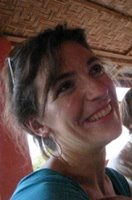
These are excerpts from essays I wrote to apply to Columbia Schools of Journalism and International Affairs, where I will be attending this fall.
Why Journalism:
Three plumes of smoke rise above downtown Kankan, Guinea, from burning truck tires lit by protesters. I am standing on the Peace Corps’ sagging plastic water tank, watching. Abou, our guard, in sandals and a silk shirt, leans against the mango tree, smoking.
Shots are fired nearby. I slide off the water tank, and crouch behind the tree. A military vehicle charges up the deserted street, turns, and heads downtown.
* * *
Peace Corps volunteers are by mandate apolitical. But after two decades of corruption and growing poverty under Lansana Conte, Guineans had organized in opposition and we were exhilarated, even if it meant a premature end to our service.
Two strikes earlier that year had led to clashes only in the capital. In my village, where agriculture was the crux of every conversation and news arrived at the weekly market, violent protest seemed implausible. Then, in December, Conte released two cronies jailed for state embezzlement, and sector-wide strikes erupted in cities throughout the country.
The six volunteers who had gathered in Kankan listened to the radio and neighborhood hearsay to try and piece together what was happening.
I had joined the Peace Corps with ambivalence. Internships at a radio station in Napa County, an environmental newspaper in Ecuador, and a political media website in San Francisco convinced me I wanted to be a reporter. Curiosity and a predilection for interviews as a complement to textual research drew me to journalism. I also love writing: ordering facts analytically and hooking readers creatively proved eternally intriguing and challenging.
What troubled me was my desire to advocate. “Can I dedicate myself to informing alone when enormous social, environmental, and health problems affect the world’s poor?” Introducing soil improvement techniques and providing nutritional training to villagers fulfilled this desire to contribute. The frustration of watching passively as Guineans protested decades of unaccountable government confirmed it. While I loved journalism, could I spend an entire career in compulsory neutrality, when part of what drew me to news was my desire to influence it?
Coverage of the strikes transformed the question. The French BBC reported, “Protests in Dalaba, Pita, Kankan and Labe, resulting in one death.” The English BBC mentioned no death, and protests in Kindia and Zerekore, but not Kankan. Radio France Internationelle (RFI) offered still more conflicting accounts. One prized visit to Kankan’s only internet cafe revealed that googling “Guinea” summoned more pages on Guinea pigs than the country.
Strike coverage was so faulty or nonexistent that to reveal the facts accurately to the rich world was itself an act of advocacy, an essential precursor to socioeconomic change. A career in journalism could both advance humanitarianism and fulfill my passion for reporting.
Why International Relations:
“How is the world ruled and how do wars start? Diplomats tell lies to journalists and then believe what they read.”
-Karl Kraus, Austrian Journalist and Press Critic
Cape Verde’s economy appears to be weathering the global credit crisis and record oil prices well. Based largely on remittances (34% of GDP in 2007), foreign aid, and a growing tourism sector, it is less vulnerable to global credit trends. As recently as September, Cape Verdean GNI per capita was a robust $2,430 US, more than twice the average for sub-Saharan countries. At a glance, economic indicators are positive.
However, a closer look at the community level reveals a different picture. The cost of bread--and other foods that require energy to produce--has increased significantly. Power outages, due to oil shortages at the national electric company, envelope the capital in darkness periodically. Water, much of which comes from oil-guzzling desalinization plants, is cut frequently. “If it’s not water, it’s electricity. If it’s not electricity, it’s water,” one resident complains.
As a Peace Corps volunteer, I am uniquely positioned to know and document the impact of domestic and international forces on Cape Verdean lives. With a good grasp of local language and a mandate to integrate, I have enjoyed privileged access to the problems behind the World Bank figures, which I have documented through my blog, radio programs, short films, and published articles.
When reporters break domestic and international news, they too must include these stories for the macro-trends to have significance. How can one communicate the meaning of a higher gas price, without a bus driver’s worries, or the significance of scarce credit, without a small businessman’s struggles? For readers, macro-trends are meaningless without case studies. Peace Corps service has rendered this journalistic responsibility intuitive, which will serve me well as I pursue a career in international reporting.
Nevertheless, equally fundamental to good reporting is an understanding of the international political and economic framework that causes, contextualizes, and is ultimately affected by these daily struggles. What underlying factors provoked the high oil prices internationally that led to bus strikes locally? One bus driver’s struggle is poignant, but meaningless, if not couched in the broader issues that represent, cause, and are shaped by it.
I seek admission to garner a sound framework that extends around the world and into recent history; one that encapsulates markets and governments, as well as people, cultures and languages; one that will allow me to become a balanced, responsible, international reporter, with an emphasis on environmental, energy and social issues in Africa.











